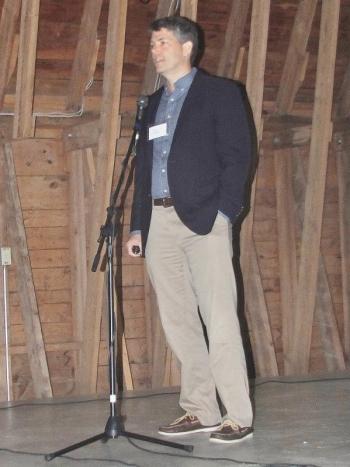Twin Villages hold ‘bridge to opportunity’ forum
 Steven Hufnagel of Damariscotta River Association discusses “The Competitive Advantage of Here and Now” in the first plenary session at the Twin Villages Business Forum on Sept. 22. GINA HAMILTON/Wiscasset Newspaper
Steven Hufnagel of Damariscotta River Association discusses “The Competitive Advantage of Here and Now” in the first plenary session at the Twin Villages Business Forum on Sept. 22. GINA HAMILTON/Wiscasset Newspaper
 Steven Hufnagel of Damariscotta River Association discusses “The Competitive Advantage of Here and Now” in the first plenary session at the Twin Villages Business Forum on Sept. 22. GINA HAMILTON/Wiscasset Newspaper
Steven Hufnagel of Damariscotta River Association discusses “The Competitive Advantage of Here and Now” in the first plenary session at the Twin Villages Business Forum on Sept. 22. GINA HAMILTON/Wiscasset Newspaper
More than 100 people attended the Twin Villages Business Forum at the Damariscotta River Association’s Darrows Barn Sept. 22 in Damariscotta. The full-day program involved several group sessions and several breakout sessions on business segments such as food, technology, communications and healthcare.
The host committee for the first-time forum was a collaboration of economic development organizations in the Damariscotta-Newcastle area and Small Business Administration officials. During the summer, the host committee’s survey of possible participants discovered that work force issues were their most significant concern. Other areas of interest included social media marketing, broadband availability, innovative business models, and resources for startups, relocations, or expansions. All were on the day’s agenda.
The main plenary sessions and the luncheon were in the barn and some of the breakout sessions were in the nearby farmhouse. In a session on communications, media and hyper-local business promotion, Alan Hinsey of Lincolnville Telecom said that within a 75-mile radius of Damariscotta there were 500,000 potential customers, out of 1.3 million Maine residents. He said employers and employees alike are looking for three t’s: technology, talent and tolerance; by 2020, the average household will have 50 devices connected to the internet, he said.
“Developing a Workforce for Maine’s New Economy” was delivered by Eliot Cutler, who works for Thornburg Investment Management. Cutler has been running a think tank at the Muskie School for several years and twice ran for governor of Maine. Cutler said we are not developing a workforce well. People need education in specific fields outside the college curricula, in part because needs change too frequently for the college system to keep up. Putting businesses in charge of training may be the best solution, but has not been considered strongly because businesses want to hire people who are ready to work from day one. But Cutler asked, what if businesses could offer college credit for training programs? What if business trainers could provide training at the college level? And how do businesses keep their trained personnel? He said there are solutions, but they will take collaborations between colleges, businesses and students, and require everyone to think outside the box.
Other sessions involved trades, manufacturing and technology, business innovation in health services, women-owned businesses, new ideas and new workspaces, growth in entrepreneurial business hubs such as food, culture, spirits, farms and other farm-to-table business ideas, and tools for expansion, relocation and startup. A whole session was dedicated to businesses on the waterfront, including aquaculture, boating, chanderly, and other sea-based and river-based business.
A luncheon of locally produced foods and drinks was provided, as well as breakfast offerings of coffee cakes, biscotti and fruit.
Mary Kate Reny, of Twin Villages Alliance, said that she was hopeful the forum would be an annual event. “This has been a success beyond our wildest dreams,” she said.
Event Date
Address
United States






















